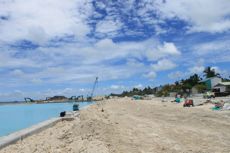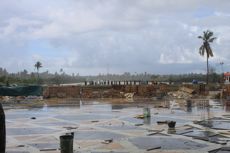The Education Ministry has appointed a special unit to provide financial support to 1000 students pursuing higher education. The unit will be overseen by a cabinet committee headed by Vice President Dr Mohamed Waheed.
The decision, based on findings by the National Higher Education Council, is expected to provide incentives for students to perform well in school as well as to reduce regional disparities and further engage the educated youth in their country’s development.
Speaking at the 2012 Australian Scholarship Awards earlier this week, VP Waheed said provision of higher education had improved, “but there is still a huge unmet need.”
O-level results in 2010 improved with a pass rate up three percent from 32 percent in 2009 and 27 percent in 2008. U-grade (ungraded) rate, previously a leading concern, has also been dropping since 2009.
Last week, the Education Ministry announced that of the 1,515 students who sat for their A-level examinations this year, 78 percent passed in three subjects and four students were awarded for achieving first place at the international level.
By contrast, statistics released by the Education Ministry in August showed that only six percent of Maldivian youth aged between 17 to 25 are pursuing higher education.
Dr Waheed pointed out that only 13 percent of students enrolled in O-level courses proceed to A-level courses. Although this represents a three-fold increase in the last decade, it still falls below the national requirement.
“Just imagine, you have 24,000 students completing lower secondary and only 300 students are entering national degree course. That’s like 1.25 percent. Although we are a middle income country, our higher education enrollment ratio is about same as countries in sub Saharan Africa.
“Compare this figure to other relevant social sector statistics. While 300 students start degree programs 3000 students await drug rehabilitation. Also last year there were 300 teen age pregnancies officially and about 600 young people entered prisons.”
“I suppose we can build more schools OR we can build more prisons.”
Currently, public and private higher education is provided by nine institutions on Male’ and in a few atolls, including Maldives National University, Maldives Polytechnic, and seven private institutions.
Dr Waheed listed inadequate or nonexistent training programs in certain areas of study, as well as weak financial assistance, as impediments to educational pursuit.
Among the factors preventing students from enrolling in university courses is the cost of living.
“Living in Male’ is expensive, and finding accommodation if you don’t have a family to host you is difficult,” said Maldives National University (MNU) Chancellor Dr Mustafa Luthfy, who called the ministry’s decision a “very encouraging development.”
Although some MNU courses are free, dormitory services are costly and limited and there is no space to expand in Male’. MNU Kulhudhufuushi and Addu campuses have hostels, he said, but most atoll students come to Male’ because they can receive support from family members. “We want to expand the other campuses,” he said.
Luthfy said another leading challenge is the quality of education, particularly English instruction. “English language is essential, as it is the language of instruction in the Maldives,” he said. “The Ministry of Education has recognised that English instruction is critical to academic achievement in the Maldives, and has invited native English speaking teachers to come here and work.”
“Most students are enrolled in secondary education, and we have been taking steps to improve the quality of education we provide,” said Luthfy. “We have seen positive results over the last three years, and we hope the improvement will continue in the future.”

